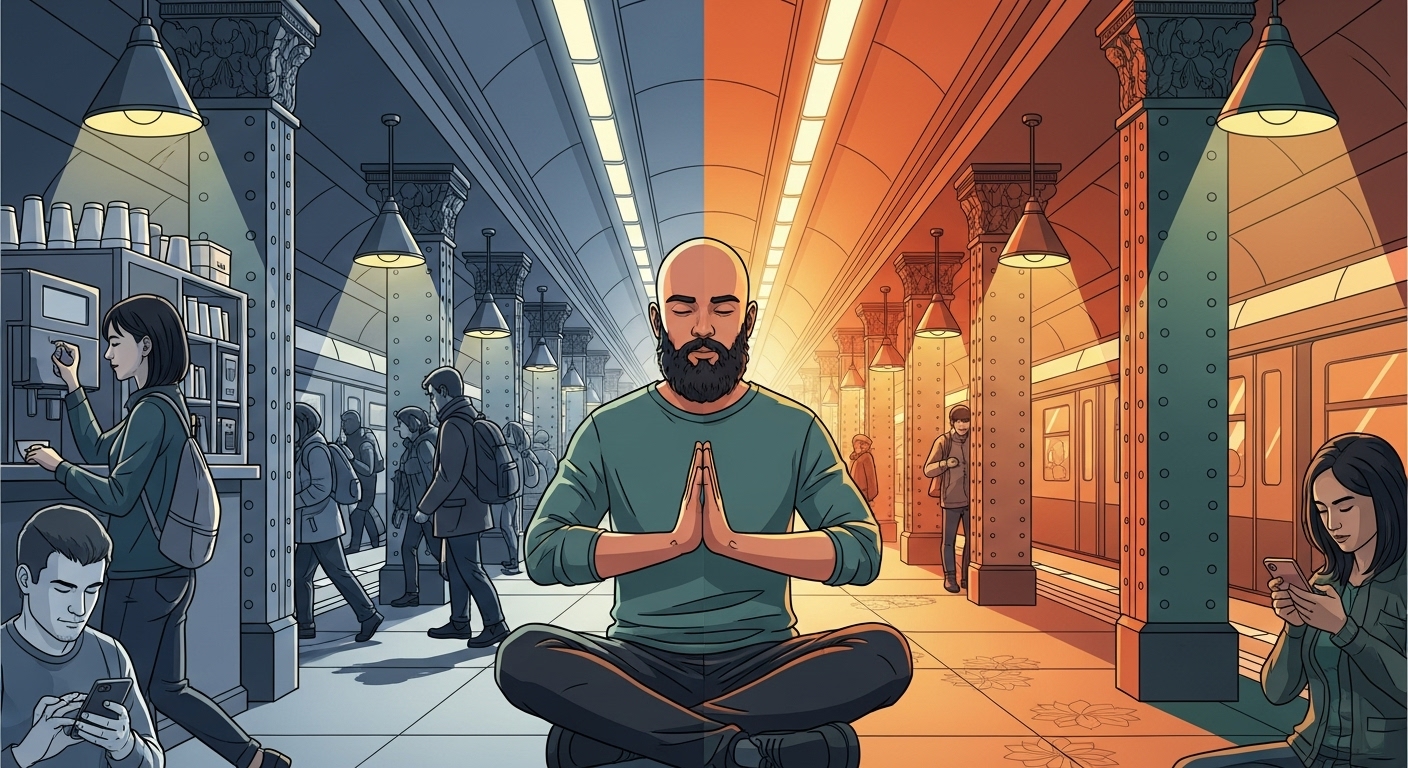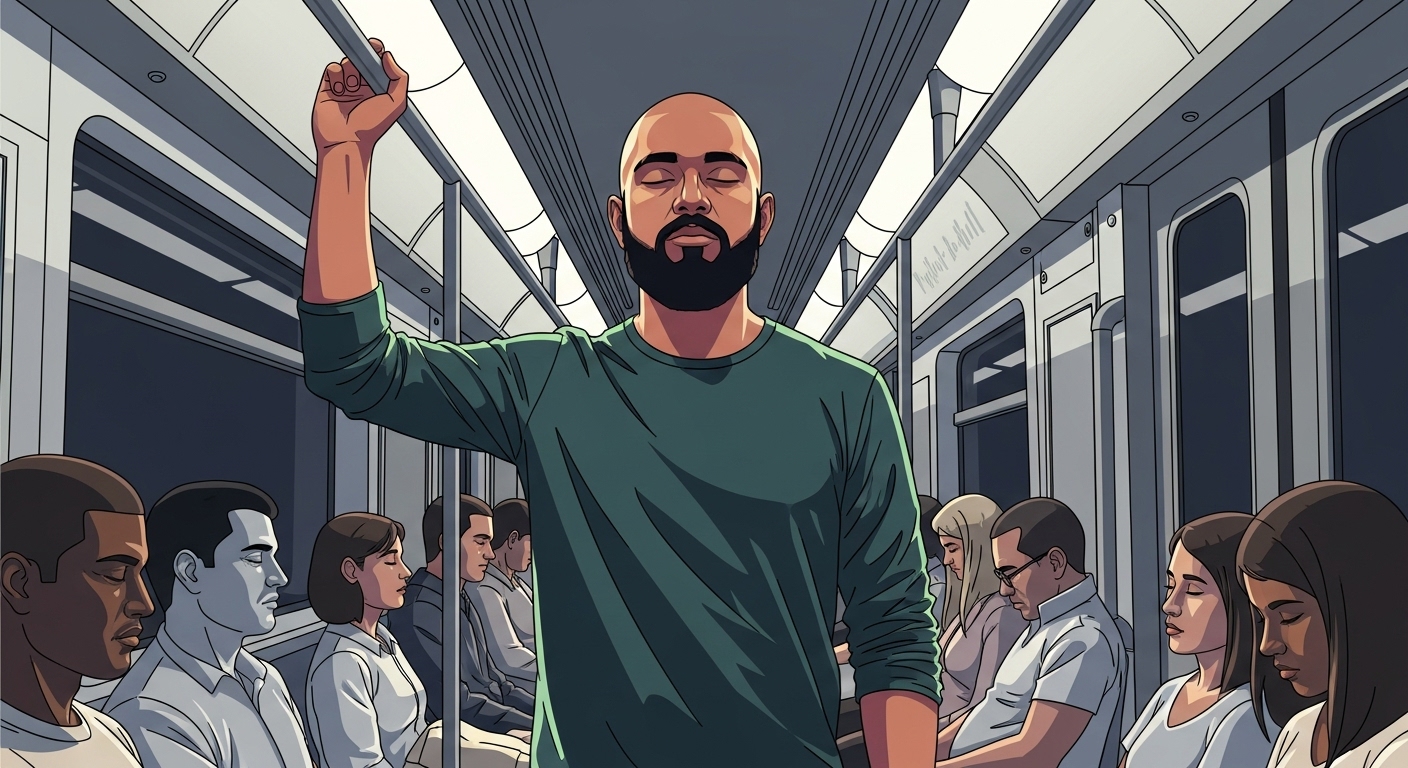Episode 6: The Subway Monastery
Marcus Wu broadcasts live from a subway platform to prove that every crowded space can become sacred ground. No escape necessary—just a shift in perception.

Can you hear it? The rumble of trains, the echo of footsteps, the garbled announcements?
I’m not in a studio. I’m on a subway platform.
And this—this is my monastery.
About This Episode
In Episode 6, Marcus Wu takes his practice to the ultimate test: recording live from the New York subway system. After discussing integration over isolation with Aria, Marcus puts ancient wisdom into modern practice.
This isn’t theory. This is meditation in the middle of rush hour chaos, proving that sacred space exists wherever we choose to find it.
What You’ll Experience
- Live sounds of the subway as part of the meditation
- The Urban Monastery Practice in real-time
- How a broken-down train became an advanced spiritual course
- Crowd Compassion technique for public spaces
- Transforming urban noise into meditation bells
- Why the city itself is your monastery
The 40-Minute Underground Teaching
Marcus shares his breakthrough moment: trapped in a tunnel for 40 minutes with furious commuters and no cell service.
“Everyone around me was radiating stress. And in that moment, I realized something profound. This wasn’t an interruption to my practice. This WAS the practice. The advanced course. Not despite the discomfort, but because of it.”
Listen Now
Key Moments
[0:00] “I’m actually recording this from a subway platform”
[46:01] Connecting to previous episodes and ancient marketplace teachers
[92:70] The broken train revelation: “This WAS the practice”
[131:45] “Every delay teaches patience. Every crowd teaches compassion”
[177:16] Beginning practice: Arriving exactly where you are
[219:25] Finding stillness without silence
[267:66] Urban Monastery Practice introduction
[306:59] First breathing technique with the city
[479:15] Crowd Compassion practice
[536:20] “Every interruption is a bell calling you back to presence”
The Urban Monastery Practice
Three core techniques for transforming chaos into calm:
1. Breathing With the City
- Inhale: Draw in everything around you (sounds, energy, even stress)
- Hold: Let it settle, don’t resist
- Exhale: Transform and release peace back into the space
2. Crowd Compassion
- Pick someone nearby (or imagine if alone)
- Silently offer: “May you find peace in this chaos”
- Expand to include more people
- Your subway car becomes a secret sanctuary
3. The Interruption Bell
- Every city sound becomes a mindfulness bell
- Announcements = wake up calls
- Sirens = presence reminders
- Construction = patience teachers
Episode Highlights
“We keep waiting for perfect conditions to meditate. But life doesn’t offer many of those moments. What it does offer is this—the crowded platform, the delayed train, the crying baby.”
“You don’t need silence to find stillness. Stillness is already here, underneath everything.”
“The city isn’t interrupting your meditation—the city IS your meditation.”
“Ancient teachers taught in marketplaces, not just mountains. And our marketplace just happens to move at seventy miles per hour underground.”
Your Urban Practice
This week, choose one regular urban experience:
- Your commute
- Waiting in line
- Walking through crowds
- Sitting in traffic
Apply one technique:
- Three breaths with the city at each stop
- Silent compassion for those around you
- Let interruptions become invitations
Watch how the same space transforms when you bring monastery consciousness to the mayhem.
Marcus’s Evolution
From panic attacks in boardrooms to finding enlightenment in broken-down trains, Marcus continues to demonstrate that awakening doesn’t require escape—it requires a shift in perception.
The subway platform where he records this episode has become his regular practice space, proving that consistency matters more than conditions.
Next Episode: Luna Rivers explores “Concrete Blooms”—how urban plants teach us resilience and the difference between breaking through and growing through obstacles. New episodes release weekly.


